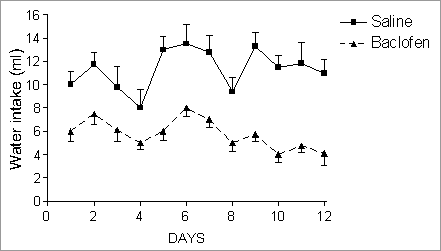Effects of chronic administration of baclofen on water intake in water deprived rats
It has previously been reported that acute administration of the GABAB receptor agonist baclofen inhibits water intake in thirsty rats by a GABAB receptor mediated mechanism (Ebenezer et al., 1992; Houston et al., 1995). There have been no reports on the effects of chronic administration of baclofen on water intake. However, it has previously been shown that chronic administration of baclofen to rats for 2 weeks results in an attenuation of its analgesic effects (Lehman et al., 2003). The present study was undertaken to investigate whether chronic administration of baclofen results in tolerance to its hypodipsic effects. Expt.1. Male Wistar rats (n=12, b. wt. 250 – 320g) were randomly divided into 2 equal groups and deprived of water for 16h a day. 15 min prior to presentation of water, the rats in the control group were injected s.c. with physiological saline while those in test group were injected with baclofen (2 mg kg-1; s.c.).This procedure was repeated daily for 12 days. Water intake was measured in experimental cages during the light cycle for 15 min (starting at 9.30 h), as described previously (Ebenezer, et al., 1992). Expt. 2. Male Wistar rats (n=12, b. wt. 240 – 330 g) were randomly divided into 2 equal groups. Rats in the control group received an s.c. injection of saline once daily for 12 days while those in the test group were injected with baclofen (2 mg kg-1; s.c.). At the completion of the treatment period, the animals were deprived of water for 16h. Fifteen min prior to presentation of water, the rats in both group were injected s.c. with either saline or baclofen (2 mg kg-1; s.c.) in a cross over fashion. All rats received both treatments. Water consumption was measured as described for Expt.1. The data from both experiments were analysed by ANOVA followed by the Newman Keul’s post hoc test. Analysis of the data from Expt. 1 revealed significant main effects of treatment (F(1,5) = 16.85, P<0.01), but no significant effects of time (i.e. days; F(11,110) = 1.18, ns) or treatment x time interaction (F(11,110) = 0.81, ns). These results indicate that tolerance does not occur to the inhibitory effect of baclofen on water intake with repeated administration (see Fig. 1). The results from Expt. 2 show that baclofen (2 mg kg-1) significantly inhibited water intake in both groups of rats to the same extent (mean water intake at 15 min ± s.e. mean: (a) Control Group: saline 11.5 ± 1.2 ml, baclofen 4.8 ± 1.8 ml, P<0.01; Test Group: saline 10.9 ± 1.7 ml, baclofen 4.6 ± 1.5 ml, P<0.01). The data from Expt. 2 lend further support to the conclusion that tolerance does not occur to the hypodipsic effects of baclofen with repeated exposure. These findings may have relevance for the clinical use of GABAB agonists.
Fig. 1. Effects of daily administration of baclofen on water intake in rats. Vertical lines rep. +/- s.e. mean. Post-hoc tests revealed that there were significant differences (at least P<0.05) between treatment groups at all time points except on Days 4 and 8.
Ebenezer, I.S. et al. (1992) Gen. Pharmacol. 23, 375 - 379. |


